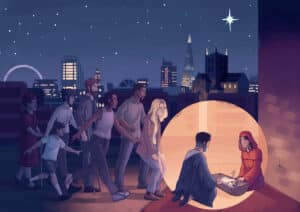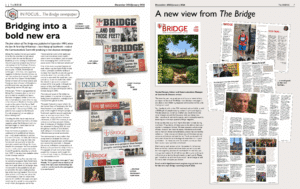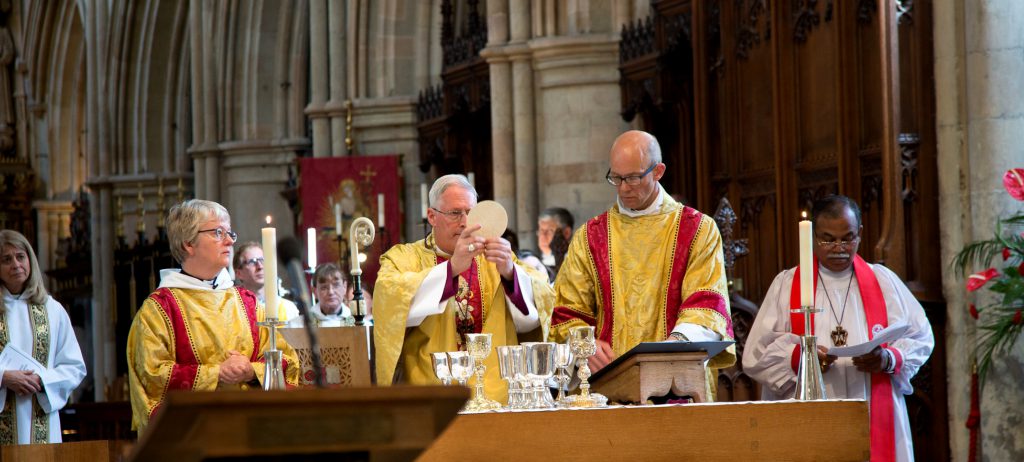
I must start with a small confession. Despite living, worshipping, and working in the Diocese of Southwark, I run the music at St. Michael’s, Camden Town north of the River. I hope you’ll forgive me – and I promise I’m not a spy! Naturally, I am a fan of traditional church music (think Stanford, Haydn, Victoria), but that isn’t to say that I don’t appreciate the wonderful breadth of music in worship and how it allows us to interact with God on a unique level – especially when words just don’t seem to cut it. I’m sure we have all experienced a moment in church where the music, liturgy, scripture, and atmosphere blend so perfectly we are left feeling a little raw. It’s difficult to put in writing, but I hope you know what I mean – and have managed to experience it.
Beginnings
Primarily, I’m an organist and apparently my fascination with the organ started before I can even remember it. As a baby, one of the only ways to stop me from screaming was to be taken round Lichfield cathedral in my buggy where I would stare at the organ for hours (and finally shut up!). The first encounter I can remember was when I was about six or seven, and my grandmother (also an organist) would let me sit on the bench with her during Mass telling me which stops I was (and wasn’t) allowed to pull out.
When I got home, I immediately told my mother that I wanted to be an organist, and I’d like to get organ lessons. I think she was rather bemused that a seven-year-old wanted to be an organist. So she organised for me to have piano lessons and after assurance that I really did want to learn the organ, I was lucky enough to have a trial lesson with the Lichfield cathedral organist; and the rest, as they say, is history. It is difficult to describe the feeling of sitting at the console of a packed cathedral whilst the congregation sing their hearts out, but it is something rather special. I’m told it is like driving a very fast car around Silverstone – but, alas, I can’t drive.
Organ Scholar
I’m very fortunate that before going to university, I was offered the organ scholarship at Hereford cathedral during my gap year. If you’ve never been to Hereford, a visit to the cathedral is worth it alone – only to be made better by the chance to hear the cathedral choir sing Choral Evensong. It was a fairly rigorous year. Chorister practice every morning, scholar’s practice every lunchtime, and Evensong every evening – with the addition of Matins and Mass on a Sunday morning! Only having Wednesday off meant a weekly total of eight services, all of which I would do again in a heartbeat.
Organ scholars are renowned for bringing a certain humour (some may say cheekiness or poor taste…) to music departments. I might have been one of these organ scholars. To give you a flavour, here are two brief snippets. I’m sure you’ll be familiar with Psalm 23, not only being one of the most well-known psalms, but also of Vicar of Dibley fame. Organs are a wonderfully expressive instrument. Sheep make a rather particular sound. By combining certain stops together (for those who want to know, the Oboe, Clarinet, and Tremulant – although, as they say on Blue Peter ‘Don’t try this at home’), the organ can emulate our woolly friends surprisingly well. This ode-ovis didn’t go down too well. I was summoned before Mr. Dean and told that whilst he appreciated my attention to the text of the psalms, he’d be grateful if it was a little less ‘foot and mouth’.
In the summer months, Hereford holds a summer fayre where the cathedral close, and most of the city streets, are filled with fayre-ground rides, families, and lots of laughter. Right outside the cathedral was a steam-organ playing familiar tunes associated with the fun-fayre in the typical twee style. This gave me an idea. After playing the opening voluntary for evensong, the organist was required to improvise whilst the choir and ministers processed into the stalls. I’m sure you can see where this is going. Sparing the finer detail, all I could see from the loft was the gents of the choir beaming as they walked in whilst the Precentor tried to hide his laughter behind a prayerbook. Fortunately, this was Mr. Dean’s day off.
The Beauty of Church Music
In an attempt to convince you that I can be musically serious, there are times where I’ve experienced the absolute beauty of music in worship. On Trinity Sunday in Camden, the choir sang Stainer’s I Saw the Lord as the offertory motet. Midway through, there is a climax in the music with the text ‘and the house was filled with smoke’. By pure chance, although I wish I could claim it was by design, this was just as the thurifer was about to cense the congregation. In the few seconds pause after this line, all that could be heard was the faint clink of the thurible chain as the ‘house’ was indeed ‘filled with smoke’. At the other end of the spectrum, I played in a worship band whilst at school. The final song in a particular service was In Christ Alone. In the third verse, as the text moves from describing the Tomb on Holy Saturday to the glories of Christ’s Resurrection, it felt as though every member of the band was one. A truly spine-tingling moment as the drums erupted and the whole chapel was lifted in song celebrating this paramount event of Christianity.
Sing out, play up, and take your part
Church music really is a wonderful thing. From the small village parish choir to the large worship band, there is one thing in common: everybody cares. I’m always touched working with church musicians at the attention to detail and desire for perfection that people have. Sure, we organists may be difficult, and that bass in the back row always complains that ‘it isn’t how we used to do it’, but at the heart of it I’m a big believer that good intentions are at the heart of it all. Whether you’re a champion of the New English Hymnal or a lover of Hillsong, own it. Enjoy it. Love it. Sing out, play up, and take your part in the great song of praise. Maybe even try another style of music – who knows, you might enjoy it.
To find out more about Church Music and Musicians Music Sunday, click here












